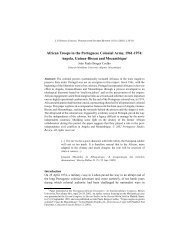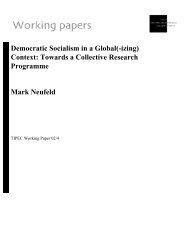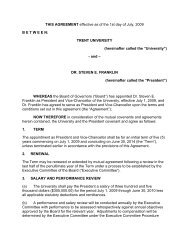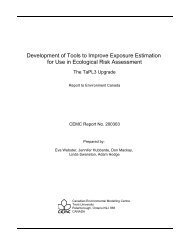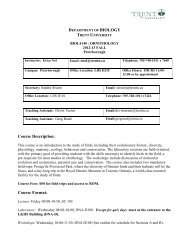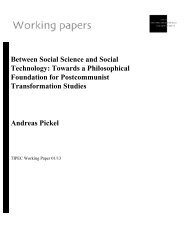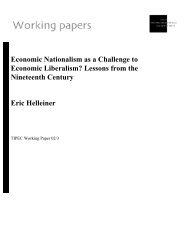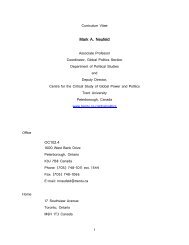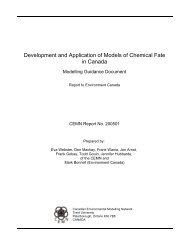Cover page working - Trent University
Cover page working - Trent University
Cover page working - Trent University
Create successful ePaper yourself
Turn your PDF publications into a flip-book with our unique Google optimized e-Paper software.
The Right and the Good in<br />
International Ethics<br />
Mark Neufeld<br />
TIPEC Working Paper 02/9
The Right and the Good in International Ethics<br />
Introduction<br />
At the beginning of the 1990s, as normative theorizing about world politics began to<br />
enjoy unprecedented growth within the discipline of International Relations, Robert Jackson<br />
drew a clear link between the question of the "good" and the focus of the field of international<br />
ethics. International theory, he argued, had traditionally ignored questions about the good life,<br />
mainly "because diplomacy and international law, by and large, ignore it". 1 However, affirmed<br />
Jackson, changes in world politics were forcing questions of the good life onto the international<br />
theory agenda:<br />
Today, political and moral theorising on international relations is expanding,<br />
arguably because the good life is affected more and more by events external to<br />
states. The growth of interest in international ethics involving such questions as<br />
nuclear war, nonintervention, self-determination, human rights, global economic<br />
distribution and the environment is an indication. 2<br />
In this paper, I want to take up the treatment of the question of the good - or rather, lack<br />
of it - within IR theory. Pace Jackson, what I shall aim to show is the way normative theorizing<br />
about world politics is contributing, not to critical reflection on the good in the global context,<br />
but to the marginalization of such reflection.<br />
Given postmodernism's rejection of universalizing discourse, it can be argued that<br />
postmodern IR theory is limited in its ability to promote critical reflection on notions of the<br />
"good life". 3 Accordingly, my focus here is on modernist approaches to international ethics.<br />
Following Charles Taylor's critique of mainstream ethical theory, 4 I will argue that international<br />
1
2<br />
ethics, notwithstanding its willingness to universalize - and indeed, in part because of it -<br />
contributes to an "ethics of inarticulacy" 5 which robs ethical reflection of its power to promote<br />
emancipatory change. 6<br />
Charles Taylor, Identity and the Good<br />
The starting point for this discussion is the germinal contribution made by Taylor in his<br />
efforts to outline and defend a view of human beings as active subjects whose moral intuitions<br />
and responses must be taken seriously. More specifically, Taylor argues it is necessary to explore<br />
the "moral ontology" which lies behind our intuitions and responses, and which makes sense of<br />
them. It does this by "offering background assumptions to our moral reactions" and by<br />
"providing the context in which these reactions have sense". 7 To phrase the matter in slightly<br />
different terms, what Taylor advocates is an exploration of "the frameworks which articulate our<br />
sense of orientation in the space of questions about the good". 8<br />
For Taylor, it is crucial that these frameworks not be seen as some optional extra since<br />
they provide "a kind of orientation essential to our identity". In this, he is intent upon countering<br />
the naturalist temper permeating modern philosophical thought, both within the academy and in<br />
society at large. It is this naturalist temper, he argues, which directs us to think of our moral<br />
reactions as being beyond any meaningful sense-making, on par with nausea, 9 or, more<br />
sophisticatedly, as values people project onto a neutral world, and within which they live<br />
unconsciously, but from which they might also abstain. 10 It is this naturalist temper, moreover,<br />
which blinds us to the centrality of "strong evaluation" in assessing ethical claims; an evaluation<br />
which goes beyond mere preferences, and
3<br />
deploys a language of qualitative worth (for example, of justice or injustice,<br />
courage or cowardice, nobility or ignobility) of the desires entertained or<br />
alternatives under consideration .... [and which] deploys a vocabulary of deeply<br />
contrastable ways of life or ways of thinking about alternatives. 11<br />
As such, "strong evaluation" involves<br />
discriminations of right or wrong, better or worse, higher or lower, which are not<br />
rendered valid by our own desires, inclinations or choices, but rather stand<br />
independent of these and offer standards by which they can be judged. 12<br />
What is particularly relevant for our discussion here is the fact that Taylor's target<br />
extends beyond the naturalist temper to include modern moral theory itself. The problem with<br />
much of this philosophy, in Taylor's view, is that it "strives to do away with these distinctions<br />
altogether, to give no place in moral life to a sense of the incomparably higher goods ...." It does<br />
this by conceiving of morality purely as a guide to action, concerned exclusively with what it is<br />
"right" to do, rather than with what it is "good" to be. As such, the central task of moral theory is<br />
identified as defining the "content of obligation" rather than the nature of the good life.<br />
In short, argues Taylor,<br />
A satisfactory moral theory is generally thought to be one that defines some<br />
criterion or procedure which will allow us to derive all and only the things we are<br />
obliged to do. So the major contenders in these stakes are utilitarianism, and<br />
different derivations of Kant's theory, which are action-focused and offer answers<br />
exactly of this kind. What should I do? Well work out what would produce the<br />
greatest happiness of the greatest number [utilitarian-consequentialist]. Or work
4<br />
out what I could choose when I have treated other people's prescriptions as if they<br />
were my own [Kantian-deontological]. 13<br />
Significantly, qualitative distinctions serve no purpose in this context - they are crucial to<br />
the agenda of articulating the contours of the good life, but it is exactly this task which<br />
mainstream moral theory holds to be of little relevance. Notes Taylor, "All we need are actiondescriptions,<br />
plus a criterion for picking out the obligatory ones". 14<br />
The reasons behind this marginalization of qualitative distinction are mixed. To a degree,<br />
Taylor locates them in the pervasiveness of the "naturalist temper" noted above, according to<br />
which we should understand human beings in the same terms as the extra-human sciences of<br />
nature. As required by the naturalist orientation, descriptions which bear on the significance of<br />
things for human beings are rejected in favour of "absolute ones", where human affairs are<br />
described in external, non-culture-bound terms. The corresponding orientation in terms of moral<br />
theory is one which thinks in terms of action - the "right". 15<br />
There are, however, also admirable sources for this focus on the "right" over and against<br />
the "good". Among them Taylor notes<br />
the defence of ordinary life and desire against the (supposedly specious) demands<br />
of "higher" goods, the modern conception of freedom [according to which, for<br />
example, individual differences in preference are to be respected], and one<br />
reading of the demands of benevolence and altruism. 16<br />
Perhaps most significantly, in terms of the factual diversity of conceptions of the good globally,<br />
is the laudable desire for a fully universal ethic. As Taylor notes,
5<br />
The goods that we articulate in qualitative distinctions are frequently those of a<br />
particular cultural group and are embedded in their way of life. If the aim is to<br />
avoid above all parochial ethical principles, then one has another reason to<br />
sideline these distinctions. 17<br />
In sum, argues Taylor, various combinations of motives and influences serve to bring<br />
Kantians and utilitarians, deontologists and consequentialists, together around theories of<br />
obligatory action, and a procedural - as opposed to substantive - conception of ethics. 18 In so<br />
doing, however, mainstream moral theory - theories of the right - suffer from serious<br />
contradictions. First, while displacing qualitative distinctions, and a mode of argumentation to<br />
defend and justify them, mainstream moral theory nonetheless retains distinctions in an<br />
unexamined form. Utilitarianism, for example, "accords rationality and its corollary benevolence<br />
the status of higher motives, commanding admiration", even while the "express theory aims to do<br />
without this distinction altogether". 19 Similarly, Kant, in insisting that "our moral obligations<br />
owe nothing to the order of nature ... rejects vigorously as irrelevant all those qualitative<br />
distinctions which pick out higher and lower in the order of the cosmos or in human nature",<br />
even while incorporating as foundational the doctrine of the dignity of rational agents. 20<br />
Perhaps the greatest liability of theories of the right, however, is that in suppressing the<br />
qualitative distinctions involved in deliberation about the good, they also suppress "the<br />
background understanding surrounding any conviction that we ought to act in this or that way ...<br />
the peculiar background sense, central to much of our moral life, that something incomparably<br />
important is involved". 21 Accordingly, theories of the right have no answer to the question of<br />
why one should be moral. It is not that they cannot "prove" right and wrong to someone who
6<br />
does not share their moral beliefs: this is an impossible task for any theory. Rather, they cannot<br />
articulate, even in their own terms, what about their injunctions is good, or valuable, or why they<br />
should command assent. 22 In short, argues Taylor, theories of the right which dominate in<br />
mainstream ethical discourse "have the paradoxical effect of making us inarticulate on some of<br />
the most important issues of morality". 23<br />
Implications for International Relations<br />
I wish to move now to the core concern of this paper - modernist international ethics. I<br />
have gone on at some length about the arguments of Charles Taylor because I believe them to<br />
have particular relevance for a field which is, understandably, highly derivative of the ethical<br />
traditions of social and political theory more generally. 24<br />
To begin, it seems readily apparent that the dominant form that normative theorizing<br />
about world politics takes is that of a theory of obligation, a theory of right action. When one<br />
reviews the significant interventions on international ethics over the last decade or so, they<br />
almost invariably break down into some variant of what Taylor has termed "procedural ethics",<br />
whether of the utilitarian-consequentialist variety, or efforts in a Kantian-deontological vein. 25<br />
Typical is the following formulation of international ethics, offered in a recent piece aimed at<br />
promoting "systematic thinking" about international ethics: "To think systematically about ethics<br />
and statecraft is to draw logically valid conclusions from ethical premises about the proper<br />
course of action in such a way as to render like evaluations in like cases". 26
7<br />
Nor is it only in terms of ethical theory that we see this pattern. The conception of norms<br />
and rules in terms of the right is also evident with discipline's study of descriptive ethics - as the<br />
case of regime analysis demonstrates. The definition of regimes as<br />
implicit or explicit principles, norms, rules, and decision-making procedures<br />
around which actors' expectations converge in a given area of international<br />
relations 27<br />
is, of course well known. Equally significant in terms of the present discussion, however is<br />
Krasner's subsequent precision of principles and norms as "beliefs of ... rectitude .... [and]<br />
standards of behaviour defined in terms of rights and obligations". 28<br />
Defining international ethics in this way has important consequences for theorizing the<br />
normative in the international realm. Specifically, in a context in which it appears self-evident<br />
that normative theorizing about international politics must be conceived as a theory of the right -<br />
when it becomes difficult even to think in terms of an alternative - the limitations of a rightoriented<br />
approach can go unrecognized, the normative content (and liabilities) of a theory of the<br />
right unexamined. To sketch out what I mean by this, I will now engage briefly the work of four<br />
individuals whose efforts represent a significant contribution to international ethics, both in<br />
terms of an analysis of the state of the field as well as in terms of their prescriptions for<br />
improving normative theorizing: i) Terry Nardin; ii) Klaus-Gerd Giesen; iii) Chris Brown; and<br />
iv) Andrew Linklater.<br />
i) Terry Nardin
8<br />
Nardin's Law, Morality and the Relations of States 29 and his subsequent elaborations on<br />
the arguments he made there, 30 have had a major impact on the development of the field of<br />
international ethics. His Oakeshott-ian arguments surrounding the nature of "purposive" and<br />
"practical" associations have elicited much commentary and discussion, 31 and provided one of<br />
the earliest efforts to construct both a meaningful organizing device for ethical argumentation in<br />
the international realm, as well as a defence of one particular tradition as superior to others.<br />
The crucial dimension of Nardin's work is, of course, the distinction between "purposive"<br />
and "practical" associations. Nardin's starting point is a pluralistic society of states, all pursing<br />
their own goals in accordance with their different conceptions of the good. Such states may join<br />
together to pursue common goals in what Nardin terms "purposive" associations - as with<br />
defensive alliances or liberal trade organizations. By definition, however, such joinings can only<br />
be "contingent" in nature. As such they can never form the basis of morality.<br />
In contrast, Nardin's notion of "practical" association is presented as the proper subject<br />
matter of international ethics, for only it is both compatible with the inherent plurality of<br />
international society and capable of providing a stable basis of rules of conduct. Nardin's use of<br />
the word "practical" is meant to signal that it is "authoritative practices" that are meant,<br />
understood as "a set of considerations to be taken into account in deciding and acting, and in<br />
evaluating decisions and actions". 32 It includes such authoritative practices of diplomacy and<br />
international law. As Brown notes, while the content of these practices may be up for debate,<br />
what is crucial is that the adjective "authoritative" means just what it says:<br />
... what is at stake is the terms under which autonomous political communities<br />
conduct their common affairs and these terms are not optional. Any political
9<br />
association which considers itself to be a state - and wishes others so to consider<br />
it - must accept the authoritative practices which statehood entails. 33<br />
With its focus on rules of action, and its concern to establish the nature of obligation in<br />
international intercourse, Nardin's approach clearly conforms to a theory of the right. 34 As such,<br />
Nardin's formulation is also subject to the kinds of criticisms advanced by Taylor. The primary<br />
difficulty with theories of the right - including deontological theories - is the way they<br />
themselves enter self-contradiction with regard to the good. On the one hand, they postulate not<br />
just first order goods, understood as desires or wants (for example, the individual purposes of<br />
states) but also higher order goods that stand qualitatively above others - in Nardin's case, the<br />
higher good of the pluralism of international society within which each state must have the right<br />
to pursue "its own ends and its own conception of the good". 35<br />
At the same time as qualitative distinctions of the good are being made, however,<br />
discursive space for a reasoned critique of such qualitative distinctions is denied. Thus when<br />
Hoffman endeavours to call Nardin's postulated overall good of pluralism of state purposes in<br />
international society into question, by noting that "The important question is ... what kind of<br />
society is desirable?", 36 Nardin's response is to accuse Hoffman - in good deontological style - of<br />
engaging in a consequentialist form of argument that reduces moral concerns to "desirability". 37<br />
As Taylor notes, the deontological assertion of the right over the good, which<br />
characterizes Nardin's response to Hoffman, has value only when confronted with<br />
consequentialist arguments:<br />
Where "good" means the primary goal of a consequentialist theory, where the<br />
right is decided simply by its instrumental significance for this end, then we ought
10<br />
indeed to insist that the right can be primary to the good. But where ... [good]<br />
means whatever is marked out as higher by qualitative distinction, then we could<br />
say that the reverse is the case, that in a sense, the good is always primary to the<br />
right. Not that it offers a more basic reason [in the sense of proof] ... but that the<br />
good is what, in its articulation, gives the point of the rules which define the<br />
right. 38<br />
In sum, it is more than possible to ask Hoffman's question in the sense of interrogating<br />
the adequacy of the overall good postulated in the terms of "strong evaluation". The problem,<br />
however, is that in leaving no space for reasoned debate about such qualitative distinctions,<br />
Hoffman's question is one Nardin's approach cannot answer. On this crucial dimension, Nardin's<br />
theory of the right must remain, lamentably, inarticulate.<br />
ii) Klaus-Gerd Giesen<br />
An undeniable strength of Giesen's work on international ethics has been his focus on<br />
"sociology of knowledge" issues within the discipline of international relations - that is, the way<br />
relations of power and interest can combine to delimit academic discourse in support of<br />
particular political projects; the way disciplinary practices can serve to restrict acceptable<br />
discourse in such a way to way as to insulate conventional wisdom from critical interrogation. 39<br />
Particularly compelling is his critique of the way in which the dominance of realism has served<br />
to drive ethical reflection down paths which are compatible with raison d'état - specifically, a<br />
utilitarian-consequentialist path, on the one hand, and an empiricist path on the other. 40
11<br />
At the same time, argues Giesen, the realist-dominated discipline has resisted and<br />
marginalized the deontological approach to ethics because of its "subversive" potential in regard<br />
to structures of power and privilege:<br />
... realists prefer a greater flexibility of judgement, one which will ensure they do<br />
not encounter any "absolutist" obstacles, but rather enjoy the greatest possible<br />
room to manoeuvre in their role of advisor to the prince ... 41<br />
Hence the hostility of the realist-dominated discipline to a deontological approach which, argues<br />
Giesen,<br />
by its very nature (unconditional prohibition of certain acts) ... can break any<br />
bond of cooperation, not to mention collusion, between science and political<br />
power. 42<br />
It can do so, he affirms, because a deontological approach provides criteria to formulate norms<br />
which must be respected unconditionally - most importantly, the rights of individuals<br />
independent of context:<br />
Accordingly, any deontological theory strives to delimit a field of moral action<br />
where the inviolable rights of the individual take precedence over any other<br />
consideration. 43<br />
There is much in Giesen's work that is commendable. His emphasis on sociology of<br />
knowledge is a valuable corrective to any temptation to consider ethical theorizing in the<br />
discipline in ideal terms, divorced from the reality of disciplinary limit-setting. It is important to<br />
be reminded of just how marginalized traditions not consistent with realist assumptions have<br />
been, though there may be some opening up in this regard in recent years. It is, of course, also
12<br />
always agreeable to see a critical orientation with regard to realism as disciplinary orthodoxy,<br />
though some might locate the problems of the discipline even more in the dominance of<br />
instrumental reason. 44 Finally, one must welcome the obvious commitment to finding some way<br />
to defend human dignity in the face of inhumane political agendas.<br />
It is also the case, however, that there is much that is problematic in Giesen's arguments,<br />
particularly in light of Taylor's critique of mainstream moral theory. To begin, given the<br />
acceptance within many realist circles of Nardin's deontological defence of practical association,<br />
the notion that deontology has traditionally be marginalized would have to be modified. 45 Giesen<br />
might well respond, with some justification, that in privileging the state as ethical subject,<br />
Nardin's formulation represents a fatal concession to realism that undercuts deontological<br />
reasoning's critical potential. As such, it could be countered that what is required is an<br />
individual-based deontology that makes human rights its focus. And an important part of such a<br />
formulation would be the right of individuals - not states - to pursue their conceptions of the<br />
good. Indeed, Giesen sees it to be one of the prime strengths of deontology that "it refrains from<br />
making statements about the good and just life, and thereby leaves to actors - whether individual<br />
or collective - complete liberty". 46<br />
The response here, however, parallels the critique of Nardin above: specifically, i)<br />
Giesen's individual-based deontology postulates a overall good of a society which respects<br />
individual rights and autonomy; but ii) in denying any place to reasoned deliberation about<br />
qualitative distinctions of the good (e.g., statements about the good and just life), Giesen's human<br />
subject-focused deontology allows no means for articulating an answer the most basic of
13<br />
questions: why should a theory which makes basic human rights and dignity command our<br />
assent?<br />
Again, Taylor's remarks about modern moral theorizing seem very much on the mark:<br />
The more one examines the motive - what Nietzsche would call the "genealogy" -<br />
of these theories of obligatory action, the stranger they appear. It seems they are<br />
motivated by the strongest moral ideals, such as freedom, altruism, and<br />
universalism.... And yet what these ideals drive the theorists towards is a denial of<br />
all such goods. They are caught in a strange pragmatic contradiction, whereby the<br />
very goods which move them push them to deny or denature all such goods. They<br />
are constitutionally incapable of coming clean about the deeper sources of their<br />
own thinking. Their thought is inescapably cramped. 47<br />
In sum, even if successful, the strategy of strengthening individual-based deontological<br />
reasoning in international ethics would be of limited use. Put simply, such a strategy would offer<br />
only an expansion of the dominant orientation in ethical theorizing - a fixation with the right<br />
over and against the good. As such, it represents little in the way of a break with dominant<br />
theorizing, or with the debilitating inarticulacy that such an approach produces.<br />
iii) Chris Brown<br />
I want now to turn briefly to a consideration of the work of Chris Brown. Brown's<br />
International Relations Theory: New Normative Approaches 48 represents one of the most<br />
influential efforts to sketch out the state of the field of international ethics. Combined with his<br />
other contributions, 49 his work represents a compelling case for the importance of international
14<br />
normative theory. At the centre of his work stands the distinction between cosmopolitan and<br />
communitarian approaches to international ethics. The difference between these two approaches,<br />
respectively, centres upon three points: i) the concept of the human subject (pre-social versus<br />
socially constituted); ii) the ethical significance of states (no normative relevance versus<br />
necessary context for ethical action); and iii) the scope of ethical judgment (universalist versus<br />
community-bound). 50<br />
This is, in many ways, a superior organizing device, allowing contending approaches to<br />
international ethics to be compared on a variety of crucial dimensions. Of course, as with any<br />
organizing device there are also problems. How is one to classify Mervyn Frost, for example? 51<br />
His neo-hegelian efforts would certainly seem to correspond to the communitarian approach, but<br />
what then do we make of his efforts to universalize ethical judgements. 52 Similarly, where is one<br />
to place Terry Nardin, whose work combines a communitarian emphasis on the state as primary<br />
and ethically significant with a deontology typical of cosmopolitanism to justify the respect of<br />
basic normative practices in interstate relations?<br />
In terms of the focus of this paper, however, it is the space allowed for treatment of the<br />
good that bears noting. On the one hand, it can be argued that the categories themselves -<br />
especially that of communitarianism - allow for the possibility of ethical theorizing oriented to<br />
the good and not just to the right. This is to be welcomed, and can be taken as evidence of the<br />
superiority of framing ethical approaches in the way that Brown does.<br />
At the same time, it can be argued that some of Brown's key formulations are more likely<br />
to accommodate than challenge conventional assumptions about ethics. One sees this, for<br />
example, in his acceptance of the highly problematic distinction between "normative" and "non-
15<br />
normative" theory. 53 And in terms of the concerns of this paper, one sees this as well in his<br />
insufficiently critical adoption of categories central to modern theories of the right, as is<br />
evidenced in his engagement with Martin Wight's well-known "Why is There No International<br />
Theory?". 54<br />
Brown targets, quite legitimately, Wight's contentious definition of political theory as<br />
"speculation about the [sovereign] state". 55 This definition has as its major effect the limiting of<br />
international theory to "speculation about relations between states" - a derivative category<br />
characterized by second-rate contributions which look all the worse when contrasted with the<br />
substantive achievements of political theory proper. Brown challenges Wight's problematic<br />
definition of political theory - a definition Wight characterizes as the "traditional meaning" of<br />
political theory "from Plato onwards" - noting that such definition "is particularly bizarre since<br />
one of the things we know for sure about Plato is that he had no experience of a `state', much less<br />
a `sovereign' state". In its place, Brown offers a decidedly less state-centric formulation: political<br />
theory as "the study of the search for justice in society". 56<br />
There is no question that Brown's alternative definition of political theory is a vast<br />
improvement over that of "speculation about the state", allowing, as it does, for a much broader<br />
and far richer understanding of international theory as a discourse not separate from - but rather a<br />
part of - political theory. This revised understanding continues to allow for "speculation about<br />
relations between states" without limiting international theory to consideration of this dimension<br />
of world politics alone. What must be highlighted as problematic, however, is the way that<br />
Brown's definition of political theory counters more than just the notion of political theory as<br />
"speculation about the state". Significantly, it also reinforces the tendency to marginalize Wight's
16<br />
second definition of political theory, which he contrasts with that of international theory as the<br />
"theory of survival": political theory as the "theory of the good life". 57<br />
Just as Wight's notion of political theory as "speculation about the state" (as opposed to<br />
justice in society) limits thinking about world politics, so a notion of political theory/<br />
international theory as oriented to the question of justice (as opposed to the good life) limits our<br />
thinking about ethics. As was already noted, modern theories of justice are theories of right<br />
action, of obligation, which develop and refine their notions of the former as they exclude and<br />
marginalize deliberations about the good.<br />
The point can be made in terms of the classical origins of political theory. Brown is<br />
certainly correct to point out that Plato was a stranger to the modern notion of the "sovereign<br />
state". It is also true, however, that Plato would have been equally mystified by the modern<br />
notion of justice, not simply because of the fact that "over time the scope of `justice' has steadily<br />
widened, coming more and more to incorporate international as well as domestic concerns", 58 but<br />
because of the modern limitation of ethics to procedural morality, separated from discussions<br />
about qualitative distinctions about the good. As Taylor notes, the broader notion of ethics which<br />
does not separate, but rather links the just and good also allows for a consideration of more than<br />
right action in regard to others. It includes as well what, for want of a better term, he calls<br />
"spiritual" questions relating to human identity - "what underlies our own dignity, or questions<br />
about what makes our lives meaningful or fulfilling....", in short, what makes our lives worth<br />
living. 59 It was these questions no less than those of right action that were central to classical<br />
political thinkers, even as they have been expunged from so much modern ethical discourse.
17<br />
In sum, from one perspective what we have in international ethics is a rich plurality of<br />
contending traditions offering radically different answers to the question "what is justice?" From<br />
another, however, international ethics is characterized by a limited discourse which is grounded<br />
in assumptions about the "good and just life", but which does not provide a vocabulary for a<br />
reasoned assessment of those assumptions. Accordingly, what is required is a re-definition of<br />
international theory which not only goes beyond the limits set by the notion of "speculation<br />
about the society of states" but which also challenges the constraints imposed by modern<br />
conceptions of ethics as theories of the right.<br />
iv) Andrew Linklater<br />
Andrew Linklater's Men and Citizens in the Theory of International Relations was a pathbreaking<br />
work when it first appeared and remains a major contribution in the effort to articulate a<br />
vision of a more "humanized international relations". 60 His concern with developing a selfconsciously<br />
critical approach to world politics - an approach making human emancipation a<br />
central preoccupation - has been a challenge to the mainstream and an inspiration to theorists on<br />
the margins. And his conception of critical theory as one affirming that "the normative purpose<br />
of social inquiry should be considered before all else" 61 has helped to promote both reflexivity<br />
and ethical reflection in a discipline not noted for its attentiveness to either.<br />
Linklater's work offers important resources for addressing the question of the "good life"<br />
in global terms. To begin, he is highly critical of the utilitarian ethics of neo-functionalist<br />
thought - an ethics, it should be stressed, which prides itself on its rejection of the "myth of the<br />
common good". 62 Rather, Linklater takes his cue from neo-hegelians such as T. H. Greene,
18<br />
orienting his work in support of the project of the "extension of the area of the common good". 63<br />
Additionally, one notes an explicit concern to link the classical emphasis on the good as<br />
indispensable to discussions of ethics to modern discussions of international justice. 64 Finally, his<br />
work evidences a concern both with the material conditions of life, 65 as well as a commitment to<br />
expose false universalizations and to resist unnecessary exclusions of difference. 66<br />
At the same time, there are limitations in Linklater's arguments. For despite explicit<br />
reference to the centrality of the good, Linklater develops his arguments in support of ethical<br />
universality and the "extension of moral and political community" 67 beyond the state in terms<br />
very much derivative of theories of the right. One sees this in his contrasting of the notions of<br />
internal and external obligation, 68 in his promotion of a conversation of moral claims leading to<br />
the formation of "community expectations about right action", 69 and in the fact that his<br />
discussion of the "good international citizen" is largely limited to explicating the notion of<br />
"citizenship" while saying surprisingly little about the "good". 70<br />
Formulating ethics in terms of a theory of the right is hardly surprising, given Linklater's<br />
heavy - though not uncritical - reliance on Kant. However, it can be argued that it is in<br />
Linklater's attempt to outline an explicitly "critical" approach - and his attending efforts to<br />
integrate the work of contemporary critical theorists such as Habermas 71 - that one can identify a<br />
reinforcement of the traditional Kantian privileging of the right over the good. As Taylor notes,<br />
the concern to define some criterion or procedure which will allow us to derive all and only the<br />
things we are obliged to do typifies Habermas' communicative ethics as well, where one is<br />
enjoined to
19<br />
think what norm would be agreed by all the people affected, if they could<br />
deliberate together in ideal conditions of unconstrained communication. 72<br />
The difficulty with formulating questions of ethics in this way parallels arguments made<br />
above. For example, Linklater may be right to conclude that our obligations are prior to the state;<br />
but what of the rejoinder that a conception of the good life is, of necessity, prior to notions of<br />
obligation? Furthermore, the weakness of deontological ethics of the Kantian (or Habermasian<br />
variety) is not just that they risk devolving into empty formalisms, (a weakness Linklater<br />
notes), 73 but that they cannot provide an answer to the question of why we should respect our<br />
obligations without assuming some notion of the good.<br />
The problems attached to inarticulacy about the good become even more acute in light of<br />
Linklater's promotion of Habermas' solution to the problem of defending universals in the<br />
absence of ultimate foundations: what Habermas has termed the "unforced force of the better<br />
argument". 74 As Brown has noted, in the present context it is imperative that critical theorists<br />
"resist unnecessary obscurity" 75 - a minimal requirement, to be sure, for any approach trying to<br />
achieve the position of "better argument". Yet it is just such obscurity on matters of the good that<br />
is entailed by formulating questions in terms of theories of the right. To the extent that<br />
conceptions of the good/ good life are unreflectively smuggled in and not subjected to critical<br />
review, the danger of falsely universalizing and unnecessarily excluding difference becomes that<br />
much the greater.<br />
Inarticulacy about the good is also a liability in terms of Linklater's efforts to promote a<br />
reflexive orientation on the part of students of world politics. In the face of incommensurability<br />
of theoretical traditions, scholars must expand their criteria of reasoned assessment to include the
20<br />
politico-normative content of contending interpretations and prescriptions. 76 This, in turn,<br />
touches upon the question of the identity of international relations scholars: the answer we give<br />
to "which interpretation of world politics is most persuasive" and "what shall we do in response"<br />
cannot be divorced from the question of "who we are" and "who we want to be". To answer<br />
these questions requires that we be at least minimally articulate on matters of the good as well as<br />
the right.<br />
Perhaps most critically, however, is the importance of articulacy about the good to<br />
Linklater's efforts to develop a mode of theorizing oriented to promoting human emancipation.<br />
Put simply, international ethics may have no more vital task than to articulate visions of the good<br />
that the wider human community can draw upon as they deliberate about the world in which they<br />
live - both to understand it and to change it. For as inarticulacy cramps our ability to make sense<br />
of ourselves and our world, so articulations of the good "can bring us close to the good as a<br />
moral source": 77<br />
To come closer to them, to come to grasp what they involve, is for those who<br />
recognize them to be moved to love or respect them, and through this love/<br />
respect to be better enabled to live up to them. And articulation can bring them<br />
closer. That is why words can empower; why words can at time have tremendous<br />
moral force. 78<br />
In short, notes Taylor, "Moral sources empower."<br />
Conclusion
21<br />
The contrast between moral theory oriented to the right as opposed to the good<br />
challenges many of our most basic assumptions about the field of international ethics. If it is true<br />
that most theorizing about international ethics is done in some variant of a theory of the right,<br />
then it places the established debates between Kantian-liberals and utilitarian-realists in a new<br />
light. Specifically, it directs us to see that this debate, while a real debate, is also a limited one.<br />
Indeed, it might even be suggested that the debate parallels the real but also limited debates<br />
between neoliberals and neorealists that mark so much mainstream American IR discourse.<br />
Accordingly, efforts to expand the realm of theoretical-empirical discourse in the<br />
discipline more generally must have their parallel in the field of international ethics. Expanding<br />
ethical discourse to create room for contending articulations of the good - for reasoned<br />
deliberations about qualitative distinctions of the good - is imperative if international ethics is<br />
not to blunder about in the same fog of inarticulacy that has plagued normative theory generally.<br />
It is doubly imperative if international ethics is to be reconstituted as a truly “critical” discourse<br />
about world politics.
22<br />
1. Robert Jackson, "Martin Wight, International Theory and the Good Life", Millennium Vol. 19,<br />
No. 2 (1990), p. 263.<br />
2. Jackson, p. 270.<br />
3. I do not mean by this the narrowly Kantian notion of universalizability, but rather the more<br />
general notion, common to utilitarianism as well as Kantianism, that the moral point of view is<br />
one which aims for maximum generalizability of its standards and conclusions. For a similar use<br />
of the notion of "universalism", see Chris Brown's discussion of cosmopolitanism in his<br />
International Relations Theory: New Normative Approaches (New York: Columbia <strong>University</strong><br />
Press, 1992), p. 24.<br />
This is not to argue, of course, that postmodernism has nothing to contribute in this<br />
regard. For a fuller discussion of the strengths and weaknesses of postmodern ethics, see Mark<br />
Neufeld, The Restructuring of International Relations Theory (Cambridge: Cambridge<br />
<strong>University</strong> Press, 1995), chapter five, as well as M. Neufeld, "What's Critical About Critical IR<br />
Theory?", in Richard Wyn Jones, (ed.), Critical Theory and World Politics (Boulder: Lynne<br />
Rienner Press, 2001), pp. 127-45.<br />
4. In particular, his Sources of the Self: The Making of Modern Identity (Cambridge, Mass.:<br />
Harvard <strong>University</strong> Press, 1989). Part I of Sources of the Self is entitled "Identity and the Good",<br />
the obvious inspiration for the title of this paper. See also Charles Taylor, "Le juste et le bien",<br />
Revue de Métaphysique et de Morale, No. 1 (Janvier-Mars 1988), 33-56.<br />
5. The phrase is Taylor's. It is perhaps important to note here at the outset that where I follow<br />
Taylor is in his arguments regarding the marginalization of discussions of the good, and the need<br />
for our (contending) conceptions of the good to be brought into the open and made the subject of<br />
critical reflection. I do not follow him to his proffered solution - i.e., the positing of an objective,<br />
theistically-derived "hypergood" to orient human thought and practice.<br />
6. Attentiveness to conceptions of the good, while a necessary condition of any truly “critical”<br />
international ethics, does not suffice on its own. A consideration of other elements that are also<br />
necessary may be found in "Thinking Ethically, Thinking Critically: International Ethics as<br />
Critique". In Maria Lensu and Jan-Stefan Fritz, (eds), Value Pluralism, Normative Theory and<br />
International Relations (London: Macmillan, 1999), 41-58.<br />
7. Sources of the Self, p. 78.<br />
8. Sources of the Self, p. 41.<br />
9. As does sociobiology.<br />
References<br />
10. Sources of the Self, p. 78. I take "naturalist temper" to be analogous to the generalized notion<br />
of "positivism" I have critiqued in The Restructuring of International Relations Theory.
11. Michael T. Gibbons, "Interpretation, Genealogy and Human Agency", in Terence Ball, (ed.),<br />
Idioms of Inquiry: Critique and Renewal in Political Science (Albany: State <strong>University</strong> of New<br />
York Press, 1987), pp. 142, 143.<br />
12. Sources of the Self, p. 4. See also "What is Human Agency?", in Charles Taylor, Human<br />
Agency and Language (Cambridge: Cambridge <strong>University</strong> Press, 1985), as well as Daniel M.<br />
Weinstock, "The Political Theory of Strong Evaluation", in James Tully, (ed.), Philosophy in an<br />
Age of Pluralism: The Philosophy of Charles Taylor in Question (Cambridge: Cambridge<br />
<strong>University</strong> Press, 1994). As Taylor notes, a good test for whether an evaluation is "strong" or not<br />
"is whether it can be the basis for attitudes of admiration and contempt". Sources of the Self, p.<br />
523, note # 2.<br />
13. Sources of the Self, p. 79.<br />
14. Sources of the Self, p. 80.<br />
15. Sources of the Self, pp. 80-81.<br />
16. Sources of the Self, p. 85.<br />
17. Sources of the Self, p. 85.<br />
18. Sources of the Self, p. 85.<br />
19. Sources of the Self, pp. 78-79.<br />
20. Sources of the Self, pp. 83-84.<br />
21. Sources of the Self, p. 87.<br />
22. Sources of the Self, p. 87. As Taylor notes, right-oriented theories<br />
leave us with nothing to say to someone who asks why he should be moral.... But<br />
this could be misleading, if we seemed to be asking how we could convince<br />
someone who saw none of the point of our moral beliefs. There is nothing we can<br />
do to "prove" we are right to such a person. But imagine him to be asking another<br />
question: he could be asking us to make plain the point of our moral code, to<br />
articulate what's uniquely valuable in cleaving to these injunctions. Then the<br />
implication of these theories is that we have nothing to say which can impart<br />
insight. We can wax rhetorical and propagandize, but we can't say what's good or<br />
valuable about them .... (p. 87)<br />
23. Sources of the Self, p. 89. For an argument that parallels Taylor's in many respects, see Paul<br />
Ricœur's critique of Rawls' A Theory of Justice, International Social Science Journal, 126,<br />
(1990), pp. 553-64. I am indebted to Manuel Orozco for this reference.<br />
23
24. For another discussion of the work of Charles Taylor which provides a useful summary but<br />
fails to address adequately the relevance of this thought to the field of international ethics, see<br />
John E. Becker, "`The Vision Thing': Charles Taylor Against Inarticulacy", Ethics and<br />
International Affairs Vol. 5 (1991), pp. 53-71.<br />
25. See Joseph S. Nye, Nuclear Ethics (New York: Free Press, 1986); Stanley Hoffman, Duties<br />
Beyond Borders: On the Limits and Possibilities of Ethical International Politics (Syracuse:<br />
Syracuse <strong>University</strong> Press, 1981); Robert Keohane, "Closing the Fairness-Practice Gap", Ethics<br />
and International Affairs, Vol. 3 (1989), pp. 101-116, for examples of the former; Charles R.<br />
Beitz, Political Theory and International Relations (Princeton, Princeton <strong>University</strong> Press, 1979)<br />
is a good example of latter.<br />
Thus, for example, after surveying no less that twelve putatively distinct traditions of<br />
international ethics Nardin and Mapel conclude that all traditions can be classified as either<br />
"consequence-oriented traditions" or "rule-oriented traditions" - that is, as one or another<br />
variants of a theory of the right. See Terry Nardin and David R. Mapel, "Convergence and<br />
Divergence in International Ethics", in Mapel and Nardin (eds.), Traditions of International<br />
Ethics (Cambridge: Cambridge <strong>University</strong> Press, 1992), pp. 297-322.<br />
26. David Welch, "Can We Think Systematically About Ethics and Statecraft?", Ethics and<br />
International Affairs Vol. 8 (1994), p. 24.<br />
27. Stephen D. Krasner, "Structural Causes and Regime Consequences: Regimes as Intervening<br />
Variables," in S. Krasner, ed., International Regimes (Ithaca, N.Y.: Cornell <strong>University</strong> Press,<br />
1983), p. 2.<br />
28. Krasner, "Structural Causes and Regime Consequences", p. 2.<br />
29. (Princeton, New Jersey: Princeton <strong>University</strong> Press, 1983).<br />
30. See T. Nardin, "International Ethics and International Law", Review of International Studies<br />
Vol. 18 (1992), pp. 19-30; T. Nardin, "The Problem of Relativism in International Ethics",<br />
Millennium Vol. 18, No. 2 (Summer 1989), pp. 149-161, as well as his contributions to Nardin<br />
and Mapel, International Ethics. For an interesting discussion on Nardin in terms of the question<br />
of relativism, see Roger Spegele, "Political Realism and the Remembrance of Relativism",<br />
Review of International Studies Vol. 21 (1995), pp. 211-236.<br />
31. See, for example, Nicholas Onuf's review of Law, Morality and the Relations of States, in<br />
The American Journal of International Law Vol. 78 (1984), pp. 939-42, as well as Chris Brown,<br />
"Ethics of Coexistence: the international theory of Terry Nardin", Review of International<br />
Studies Vol. 14 (1988), pp. 213-22.<br />
32. Law, Morality and the Relations of States, p. 6. See also Brown, "Ethics of Coexistence", pp.<br />
214-15.<br />
33. "Ethics of coexistence", p. 215.<br />
24
34. What is striking about Nardin's work, his realist-derived "state-as-actor" assumption<br />
notwithstanding, is the decidedly deontological - even Kantian - cast to his argument. For<br />
example, the notion that authoritative rules much be respected if a state is not to enter a state of<br />
self-contradiction - that the practices of international society are "equivalent to rights that cannot<br />
logically be claimed for one's own state without extending them to other states ("Brown,<br />
"International Theory and International Society", p. 193.) - could easily be taken as a statist<br />
reformulation of Groundwork of the Metaphysics of Morals.<br />
35. Law, Morality and the Relations of States, p. 19.<br />
36. Mark Hoffman, "States, Cosmopolitanism and Normative International Theory", Paradigms:<br />
Kent Journal of International Relations Vol. 2 (1988), p. 66.<br />
37. Nardin, "International Ethics and International Law", p. 27, note #15.<br />
38. Taylor, Sources of the Self, p. 89.<br />
39. Giesen's major work on international ethics to date is his L'Éthique des Relations<br />
Internationales: Les Théories Anglo-Américanes Contemporaines (Bruxelles: Établissements<br />
Émile Bruylant, 1992). See also Giesen, "Corporatisme paradigmatique, théories déontologiques<br />
et nouvel ordre mondial", Études Internationales, vol. 24, no. 2 (1993), pp. 315-29, as well as<br />
Giesen, "Entre décisionnisme et structuralisme: la précarité de l'éthique individuelle dans les<br />
théories des relations internationales", in Michel Girard (ed.), Les Individus dans la Politique<br />
Internationale (Paris: Economica, 1994), pp. 25-38.<br />
For an interesting review of francophone literature on international relations that displays<br />
a similar sensitivity to "sociology of knowledge" issues, see Giesen, "French Cancan zwischen<br />
Positivismus, Enzyklopädismus und Historismus: Zur Struktur und Geschichte der<br />
vorherrschenden französischsprachigen Ansatzforschung", Zeitschrift für Internationale<br />
Beziehungen, vol. 2, no. 1 (1995), pp. 141-70.<br />
40. "Corporatisme paradigmatique", 318-20. Giesen also discusses a third realist-inspired path -<br />
that of scepticism - but notes this orientation has been abandoned with the advent of neorealism.<br />
There would seem to be some parallel here with Brown's felicitous observation that realistinspired<br />
scepticism is no longer a serious option - if indeed it ever was - because "few people<br />
actually live down to their lack of belief in international ethical standards". See Chris Brown,<br />
"The Project of International Ethics: Fad Fantasy or Field?", Paradigms: The Kent Journal of<br />
International Relations Vol. 8, No. 1 (1994), p. 3.<br />
41. "Corporatisme paradigmatique", p. 325, my translation.<br />
42. "Corporatisme paradigmatique", p. 325, emphasis added, my translation.<br />
43. "Entre décisionnisme et structuralisme", p. 37, my translation.<br />
25
44. See The Restructuring of International Relations Theory, as well as Mark Neufeld, "Who's<br />
Afraid of Meta-Theory?", Millennium: Journal of International Affairs Vol. 23, No. 2 (Summer<br />
1994), pp. 387-93.<br />
45. Curiously, Giesen does not acknowledge the unmistakably deontological dimension to<br />
Nardin's work, classifying his work as "neo-realist empiricist" ethics. "Corporatisme<br />
paradigmatique", p. 326, note #38.<br />
46. "Entre décisionnisme et structuralisme", p. 37, my translation. In this he is paralleled by<br />
Michael J. Smith, who affirms that one of the greatest strengths of the liberal approach<br />
is that it respects the right and the capacity of the individual to define his own<br />
conception of "the good". Only in this way, when individuals ... have the liberty<br />
to set their own goals - and, when necessary, to bring them into harmonious coexistence<br />
with the goals of others - can a true conception of the common good<br />
emerge.<br />
See Michael J. Smith, "Liberalism and International Reform", in Nardin and Mapel, Traditions<br />
of International Ethics, p. 210.<br />
47. Sources of the Self, p. 88.<br />
48. (New York: Columbia <strong>University</strong> Press, 1992).<br />
49. Most recently, "International Theory and International Society: the Viability of the Middle<br />
Way?", Review of International Studies Vol. 21 (1995), pp. 183-96.<br />
50. See also Cochran, "Postmodernism, ethics and international political theory", p. 242-3.<br />
51. See Mervyn Frost, Towards a Normative Theory of International Relations (Cambridge:<br />
Cambridge <strong>University</strong> Press, 1986).<br />
52. As he does with regard to human rights standards (albeit, absent the positing of an external<br />
standpoint). Brown notes this desire to universalize, but does not comment on the difficulty this<br />
poses for his communitarian-cosmopolitan distinction.<br />
Giesen also deals less than successfully with Frost in this regard. Having understood<br />
correctly that Mervyn Frost's neo-hegelian work does not conform to realist scepticism,<br />
consequentialism, or empiricism, Giesen classifies Frost as a deontological theorist along with<br />
Beitz and Linklater. See "Corporatisme paradigmatique", p. 327, note #41. Questions can also be<br />
raised regarding Giesen's classification of "natural law" as a deontological approach when it, like<br />
Aristotelianism, is more properly seen as a theory of the good in contrast to modernist ethical<br />
theorizing's general conformity to a theory of the right.<br />
53. For a fuller discussion of this point, see Neufeld, The Restructuring of International<br />
Relations Theory, chapter five.<br />
26
54. Wight's piece is contained in H. Butterfield and M. Wight (eds.), Diplomatic Investigations<br />
(London: Allen and Unwin, 1966).<br />
55. Wight, p. 17.<br />
56. Brown, International Relations Theory, p. 7.<br />
57. Wight, p. 33. On can, of course, raise questions about whether Wight's notion of the "good"<br />
is similar enough to that of Taylor to allow for the kind of inference being drawn here. One<br />
might well object that in discussing ethics, Wight, like Brown, regularly made use of the word<br />
"justice" (for example, in International Theory: The Three Traditions and in Power Politics). In<br />
defence of the inference being drawn here, however, it should be noted that it is possible to give<br />
Wight's talk of justice an Aristotelian reading: i.e., justice, not in the abstract (procedural ethics)<br />
but issuing in judgements based on phronesis (substantive ethics). Thus, in International Theory:<br />
The Three Traditions, Wight grounds the rationalist's political theory in Aristotle's understanding<br />
of the state as making possible the good life (p. 22), and in the notion that there is a purpose or<br />
realm - in Aristotle's case, "virtue" (p. 99) - higher than the political. See M. Wight,<br />
International Theory: The Three Traditions, edited by Gabriele Wight and Brian Porter,<br />
(Leicester: Leicester <strong>University</strong> Press for the Royal Institute of International Affairs, London,<br />
1991).<br />
Of course, it is also possible that Brown's conception of political theory/ ethics as "the<br />
study of the search for justice in society" should be understood, like Wight's, in Aristotelian<br />
terms. In this case, the critique made here of Brown is misplaced. A demonstration of equal<br />
indebtedness to Aristotelian notions would have to be provided, however, before such a reading<br />
of Brown's formulation is fully plausible.<br />
I am indebted to Roger Epp for this reading of Wight. See also R. Epp, "Martin Wight:<br />
International Relations as Realm of Persuasion", in Francis Beer and Robert Hariman (eds.),<br />
Post-Realism: The Rhetorical Turn in International Relations (East Lansing: Michigan State<br />
<strong>University</strong> Press).<br />
58. International Relations Theory, p. 7.<br />
59. Sources of the Self, p. 4<br />
60. A. Linklater, Men and Citizens in the Theory of International Relations, 2nd edition,<br />
(London: Macmillan, 1990), p. 203.<br />
61. A. Linklater, "The Question of the Next Stage in International Relations Theory: A Critical-<br />
Theoretical Point of View", Millennium 21, no. 1, (1992), p. 91.<br />
62. E. B. Haas, Beyond the Nation-State (Stanford, 1964), p. 34, quoted in Linklater, Men and<br />
Citizens, p. 7.<br />
63. See Men and Citizens, p. 228, note # 20.<br />
27
64. See, for example, Linklater's linking of the concerns of Aristotle and Kant in his "What is a<br />
Good International Citizen", in Ethics and Foreign Policy, edited by Paul Keal, (Canberra: Allen<br />
& Unwin, 1992), pp. 23, 26.<br />
65. See, for example, Men and Citizens, p. 200.<br />
66. See his "The Question of the Next Stage".<br />
67. "The Question of the Next Stage", p. 93.<br />
68. Men and Citizens, pp. 38-41.<br />
69. The phrase is Richard Falk's, quoted in Men and Citizens, p. 196 (my emphasis).<br />
70. "What is a Good International Citizen?".<br />
71. See, for example, Linklater's discussion of Habermas' notion of "social learning" in the<br />
moral-practical sphere, in "The Question of the Next Stage", p. 95. See as well his discussion of<br />
Habermas and Foucault in the "Postscript" to Men and Citizens (2nd edition). See also his<br />
elaborations on this theme in A. Linklater, The Transformation of Political Community: Ethical<br />
Foundations of the Post-Westphalian Era (Oxford: Blackwell Press, 1998).<br />
72. Sources of the Self, p. 79. See also Charles Taylor, "Language and Society", in<br />
Communicative Action: Essays on Jürgen Habermas's The Theory of Communicative Action,<br />
edited by Axel Honneth and Hans Joas, translated by Jeremy Gaines and Doris L. Jones<br />
(Cambridge, Mass.: The MIT Press, 1991).<br />
73. Men and Citizens, p. 104.<br />
74. There is a clear parallel here with what Taylor has termed "interpretive dialectics" - a form of<br />
reasoning which, in contrast to the claim of "strict dialectics" (which makes claims to an<br />
undeniable starting point), posits no such foundation and yet still aims to convince us by means<br />
of reasoned arguments: "by the overall plausibility of the interpretations [it] give[s]". See Taylor,<br />
Hegel and Modern Society (Cambridge: Cambridge <strong>University</strong> Press, 1979), p. 64.<br />
75. Chris Brown, "`Turtles All the Way Down': Anti-Foundationalism, Critical Theory and<br />
International Relations", Millennium, 23, no. 2 (1994), p. 236.<br />
76. James Der Derian makes this point with regard to realism. See James Der Derian, (ed.),<br />
International Theory: Critical Investigations (New York: New York <strong>University</strong> Press, 1995), p.<br />
6. For a defence of this argument in terms of any and all theoretical approaches to world politics,<br />
see Neufeld, The Restructuring of International Relations Theory, chapter three.<br />
77. Taylor, Sources of the Self, p. 92.<br />
78. Sources of the Self, p. 96.<br />
28




